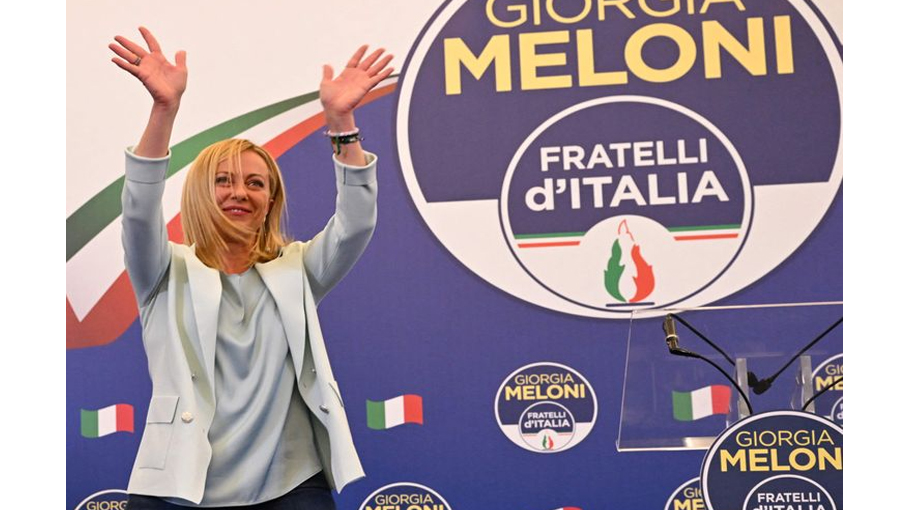A sensational breakthrough for the hard-right in Italy

Europe held its breath as Italian voters went to the polls on Sunday in a national election whose end result saw Brothers of Italy, a party with neo-fascist roots, securing a sizeable victory in both houses of parliament and scooping as it did a larger share of the vote any other party, thus providing its leader, Georgia Meloni, the opportunity to become the most far-right prime minister the country has ever had in a century — certainly since Benito Mussolini’s 1922 march on Rome, which subsequently brought him to power.
Addressing her supporters in the early hours of Monday morning, Meloni said that her party’s victory represented a moment of “redemption” for Italy. It will, however, be weeks before a new parliament is seated, a new coalition government is formed and Meloni herself gets down to work.
Given the fact that Brothers of Italy had a meagre 4.5 per cent of the vote in the elections held in 2018, the party has come a long way, achieving for itself nothing short of an astronomical rise in popularity.
The rise in that popularity is, as is well known by everyone now, part of a reactionary wave that is transforming, albeit imperceptibly and incrementally, the very ethos of Europe’s political culture and national soul, the most recent manifestation of which had taken place earlier this month in Sweden, where another hard-right group, Sweden Democrats, which had been founded in 1988 by neo-Nazis, became the largest party in the nation’s governing coalition, having won 20.5 per cent of the vote, giving it the second highest number of seats in parliament.
Only time will tell if the strong-willed
Meloni can turn with this turning moment
in Italy’s modern history and, if so, what
impact her tenure will leave
on the rest of Europe
So, you say, as I do, my goodness, if it could happen in Sweden — historically open-minded, laid-back, good-hearted Sweden — well, then, no other country in Western Europe is immune to an assault on the core values of John Lockian liberalism that underpin its system of government.
It could and it did. The wave has already hit virtually every country on the continent, leaving an impact on the sensibility of European publics everywhere. This was no more evident than in the 2014 European Election, where both the centre-right and the far-right parties across the EU scored breathtaking successes in Denmark, Slovenia, France, Greece, the United Kingdom, Italy, Austria and, yes, Sweden.
And recall how, more recently, in the April run-off elections in France, Marie le Pen’s National Rally gained a record 13.3 million votes, over 41 per cent of the total, with the incumbent president, Emanuel Macron, barely eking out a win.In short, hard-right parties across the Continent, with like-minded ideological views, are now a European phenomenon, a new normal, as it were.
Why does it — should it — matter at all to us non-Europeans? Simply this: We live in a globalised world where social, political and cultural transformations in one part of it will in good time very likely affect the whole.
Problem with the hard-right
The problem with the hard-right, as it is indeed with the hard-left, is that, as the adjective that qualifies them indicates, is that they are hard to reason with. Katherine Barkey, a vice president of the European Parliament and a member of Chancellor Olaf Scholtz’s Social Democrats had her own opinion of those among them leading a government.
“Our experience with this sort of government”, she said, referencing in this case Poland and Hungary, “is that they do not engage in compromise”.
And it is virtually impossible to engage those on the extreme, whatever their calling, because the constitution of these folks’ personality is afflicted with what is known in therapeutic liberation as “meta-cognition”, in effect, they refuse to accept the fact that they are wrong — and thus should modify their views when presented with contrary evidence, for they thrive in an environment where only their idea of what is right and is wrong prevails.
Tell them, say, about the valuable contribution that immigrants make, at the end of the day, to their host-states, and they will have none of it.
Alas, the surge of refugees into Europe in recent years was part of the reason for the emergence of charismatic, rabble-rousing leaders railing against “the establishment” and its elites who won’t listen, a message that the mass sentiment was readily responsive to. Not unlike Marie le Pen in France, Georgia Meloni, the Rome-born, 45-year-old mother of two, has spent years fighting her way to the top of Italian politics. Now that she has made it there, the question is whether, given her limited experience in government, she will succeed in the daunting task of cobbling together a coalition cabinet qualified enough to govern and integrated enough to last, Analysts who have followed the election campaign from its outset have their doubts, among them the noted commentator Angela Ciuffrida, who wrote in The Guardian that “maintaining unity will be a near impossible job in the months ahead”.
Only time will tell if the strong-willed Meloni can turn with this turning moment in Italy’s modern history and, if so, what impact her tenure will leave on the rest of Europe.



